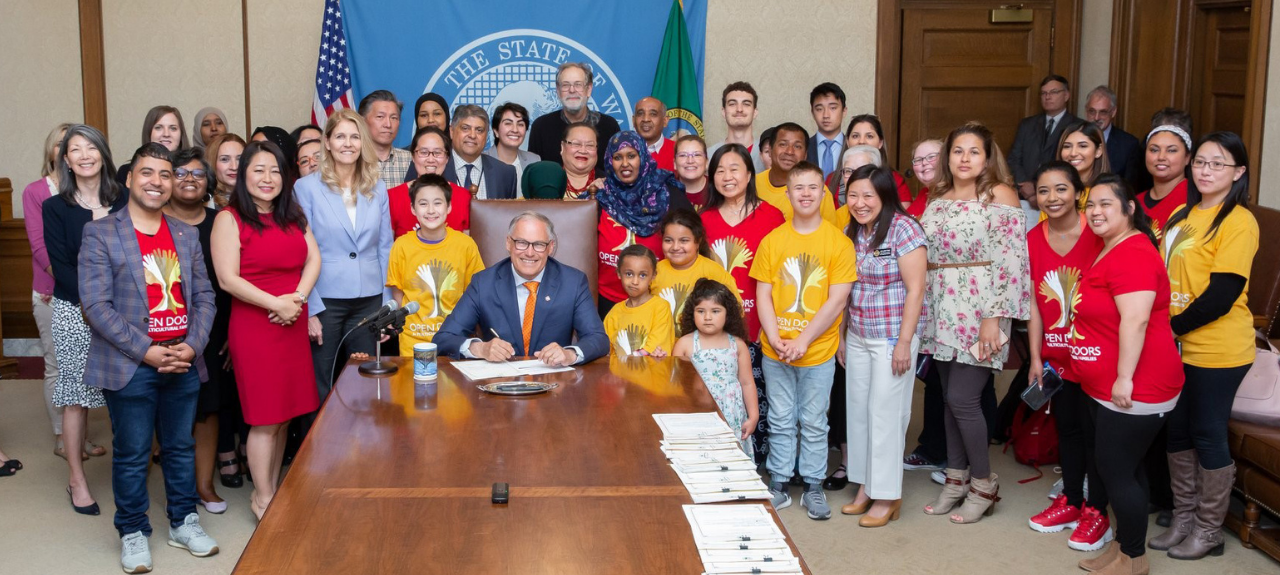How Open Doors for Multicultural Families is Meeting the Needs of People with Intellectual/Developmental Disabilities and their Families
“You have to love yourself first and build self-confidence.” This is the mantra Ginger Kwan holds as she helps multicultural families navigate complex special education systems. As the mother of a son with a disability, Kwan understands these struggles firsthand. Yet, as Kwan shared in this story for the South Seattle Emerald, one of the most prominent barriers families must navigate is the school system.
“The families we serve are not on the same playing field as other families,” said Kwan. Federal and state law requires school staff to facilitate meaningful two-way communication with culturally and linguistically diverse families in a language they understand. Unfortunately, Washington state often falls short of this requirement. Kwan —and other parents facing similar challenges — sought a solution.
In 2009, they founded Open Doors for Multicultural Families (ODMF) to help parents ensure their children have access to the support they need. Since launching, the organization has grown to more than 40 full- and part-time staff who speak 20+ languages, including Spanish, Somali, Korean, Mandarin, Cantonese, Vietnamese, Amharic, Tigrinya, and Arabic. Last year, they provided linguistically and culturally responsive services to more than 2,000 families.
Seattle Foundation is a trusted partner in their work. Several programs, including Vibrant Democracy Initiative, Communities of Opportunity, and Civic Leadership, have supported ODMF throughout the years. In fact, the Foundation’s grassroots grantmaking initiative Neighbor to Neighbor provided ODMF one of its first grants in 2011 – offering $5,000 to connect diverse parents together to address their challenges and support needs.
“Seattle Foundation has been our backbone in terms of flexible funding that allows us to grow and serve our community. Thank you for helping us engage with families and young people with disabilities to help them realize their unique talents, imagine a bright future, and advocate for the tools and resources they need to succeed,” said Kwan.
The organization has also received support from Seattle Foundation to expand efforts like increasing voter engagement among multicultural families. This sustained funding helped ODMF achieve a big policy win in support of Language Access, which required school districts to document if they are following the law and formed a workgroup that made comprehensive recommendations ensuring families across the state have access to qualified interpreters and translations. But systems are resistant to change, and it will take widespread family and student’s voices to make sure Legislators pass meaningful policies in the 2022 Legislative Session. This is why Open Doors is building multilingual Family Leaders via their Multicultural Family Leadership training. Graduates are applying the tools that they learned by educating fellow parents, co-facilitating Listening Sessions in their native languages, sharing their stories, and speaking out at public meetings.
“We have done a lot of great things, and we have also learned that we also have to be true to what the community needs are. We also have to be very persistent and very courageous,” Kwan said in a video describing the impact that Neighbor to Neighbor had on her organization.
This courage has compelled ODMF to engage in policy and advocacy with the leadership of individuals with developmental disabilities and their families. These efforts directly align with achieving “A Just Democracy,” one of three pillars of Seattle Foundation’s Blueprint for Impact. A Just Democracy means that individuals and communities are equitably represented and hold political power so that policies and processes center those most impacted by inequities. ODMF is creating a path for people most negatively affected by our state’s systems to lead solutions.
“For many of us who are parents or individuals who have disabilities, I think what we want is… to have a society that truly values us,” Kwan told the South Seattle Emerald this past August. “We all want to have our voices heard.”
To learn more about the Blueprint for Impact and for ways to invest in it, contact your philanthropic adviser.

